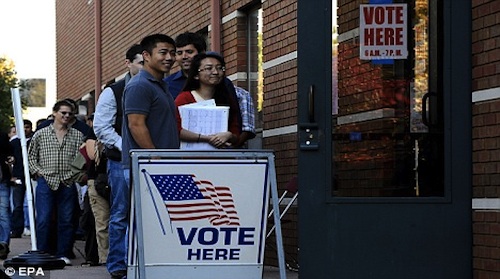Speech at GAO: Learn to Vote and Mobilize the AAPI Vote
TD 05/27 38674.5/2

Good afternoon, Ladies and Gentlemen:
It is my great honor to speak here on behalf of 80-20 initiative. In next a few minutes, I would like to share with you a few stories that are related to Asian American or AAPI vote.
1. New York City Story
In the summer of 1982, New York City decided to build a new prison in Chinatown. The news stirred up many protests from local residents and business people. What the community needed most was not a new correctional facility but more apartments, schools, day-care centers, clinics, and commercial space.
Despite the community's opposition, the New York City Planning Council voted to proceed with the original prison plan. The protests had minimum impact on the local elected officials partially due to low Asian American voting rate. While dismissing a massive Chinatown protest against the proposed construction, as then Mayor Ed Koch said it clearly: "You don't vote, you don't count."
This story has been circled again and again in Chinese American social media in recent years as a painful reminder that you must register and vote.
2. Creation of 80-20 Initiative
Asia Gate story: During Bill Clinton’s re-election campaign in 1996, the media did much to fan the flame of bias and stereotyping against Chinese American fundraisers for the Democratic Party, spreading fears of the foreign influence taking over the U.S. Presidency. The national media focused considerable coverage on allegations of illegal fundraising and improper behind-the-scenes handling by DNC Asian American fundraisers.
Frustrated by what he viewed to be the exploitation of Asian American’s political inexperience as evidenced by “Asia Gate”, Dr. S.B. Woo, the former Lieutenant Governor of Delaware, set out to organize support to prevent its recurrence. As a former politician, Dr. Woo believed that in order to defend ourselves, Asian Americans must become familiar with US political rules and develop enough political strength, working collectively to reward politicians who cared for our rightful concerns and to punish those who didn't. To communicate effectively with all Asian Americans and to forge a bloc vote, he harnessed the power of the Internet. Dr. Woo, together with several other Asian American leaders, compiled a huge e-mail list. (It was much easier to collect emails in 90s) In September 1998, 80-20 Initiative was created in California.
3. 80-20’s idea of Bloc Vote
A bloc vote is a group of voters that are strongly motivated by specific common concerns causing them to vote together for one candidate or one party in a election. 80-20 strives to form a bloc-vote to support supporting the presidential candidate who can do best to help AsAms to achieve equal opportunity and justice. If 80% of AsAms vote for and donate to the 80-20 endorsed candidate, our collective voting power will become a political force that cannot be ignored.
In a two-party system, if both party’s candidates have close to 50% support, for example 48%-47% without Asian American’s votes, then the 5% Asian votes will tip the balance. If we have more than three percent vote for one of the candidates, we will be the decisive force from a final 52% vs 48 or 51% vs %49 result.
4. 80-20’s Endorsement Procedures
For Primary Elections: Two months prior to the presidential primary held in New Hampshire, the President of 80-20 will write each of the presidential candidates of major political parties and seek his/her commitment to support 80-20's major goals and programs. We often use a questionnaire. 80-20 will announce the primary candidates' responses as they become available. 80-20 urges its supporters to WITHHOLD financial and other forms of support to any presidential PRIMARY candidate who fails to pledge his/her commitment in writing and in accordance with 80-20's pledge requirements. Our supporters shall vote only for primary candidates who have already met 80-20's pledge requirements.
Currently, among all the 2016 presidential candidates, only the Hillary Clinton campaign replied to 80-20’s questionnaire. Although not totally satisfied, the 80-20 board has decided to support Hillary in the California primary. Once Bernie Sanders campaign heard this news, his campaigning office contacted 80-20 and tried to negotiate to win 80-20’s support. This just occurred on this Monday, 80-20 is still talking to Bernie Sander’s office for decisions. This situation reminiscent of the 2008 Obama vs Clinton campaigning. Then Senator Obama ignored 80-20; 80-20 thus helped Hillary win the California primary. After that, Obama quickly agreed 80-20’s requirements. All the reference materials are archived in 80-20’s website.
Upon the completion of the primary, in the general election 80-20 will endorse the presidential candidate of the political party having accomplished the most DEEDS to help APAs achieve equal justice and opportunity in the four years preceding the current presidential election. The strength of a candidate's letter to 80-20 may also be taken into account. An endorsement convention, whose Delegates are elected by the membership and are composed of equal portions of Democrats, Independents and Republicans, shall determine which candidate is the more deserving of our support.
80-20 is a non-partisan, independent political action committee. However, in the past 4 general elections since 80-20’s existence, none of the Republican candidates have responded to 80-20 questionnaires; consequently 80-20 has only endorsed Democratic Party candidates although we have also endorsed many state and local Republican candidates. We hope the final Republican candidate can respond to 80-20’s questionnaire this year.
5. Defeat SCA5 Story
California’s Proposition 209 (approved in November 1996), amended the state constitution to prohibit state institutions from considering race, sex, or ethnicity in the areas of public employment, public contracting, and public education. However, in 2014, a California senator introduced Constitutional Amendment 5 known as SCA 5, and trying to re-introduce race and ethnicity to the college admission process.
SCA5 caused strong protest in many Asian American communities; over concerns it would severely reduce the admission rate of Asian American students to highly-ranked state colleges. 80-20 initiative played a key role in organizing and guiding APA voters on using proper ways to voice their opposition to the SCA5. Eventually, three Chinese American Assembly members reversed their support to SCA 5, and the bill was withdrawn. After SCA 5 was defeated, 80-20 issued calls to California Asian voters, asking them register to vote, and to defeat the elected officials who have been negligent in defending our rightful interests. As a result, two Asian American politicians who supported SCA5 were removed from the assembly.
6. Local Chapter activities
As the Asian American population increases, many local Asian American communities are seeking help in expressing their particular concerns on education standards, job opportunities, discriminations, and injustices they may face. 80-20 encourages and helps local Asian American communities to establish local chapters to address their local issues through the US political processes. Local chapters receive free training and consulting from experienced national leaders.
We established the 80-20 Washington DC chapter two and half years ago; and have engaged in many local elections, fundraising events, and national civil rights rallies.
A. 2014 Congressional election: In VA congressional district 10, there were two candidates competing for the position. John Foust (D) vs. Barbara Comstock (R). Based on 80-20’s procedure, we sent them both a questionnaire on VA college admission policies, the glass ceiling issue, communication with Asian Americans, and school education standards. After many conversations, Barbara Comstock sent us detailed answers to our questionnaire and our chapter was satisfied with her answers. Unfortunately the other candidate, John Foust, after many personal contacts, did not reply to our questionnaire. Our Chapter unanimously decided to endorse Barbara Comstock. We published our endorsement in local Chinese newspapers and websites. We believe our efforts made a difference; Barbra Comstock won the election and became the Congresswomen for VA District 10.
B. School board election: 80-20 DC Chapter has many members in Northern Virginia as students’ parents and as volunteers in local Chinese language schools. In 2015, the Fairfax County School Board was subject to re-election. Because education is one of the most important issues for the majority of Asian parents, many parents were concerned about a budget cut and its impact on local GT centers and funding to Thomas Jefferson High School (a Sicence and Tech magnet school), as well as social policies. We worked with parent group and organized many sessions where the school board candidates could openly communicate their views and plans with Asian parents and students. The parents quickly established two social media groups (using an App called WeChat) with over 800 members. Together with the parents group, we endorsed many new candidates for the school board. As a result, the school board added a few new faces; including one candidate (Tom Wilson) we endorsed who won the election by only 180 more votes. Many voters felt the first time that every vote was important, that it was worth the effort to knock the neighbors’ doors.
C. Another example is with large community elections: In Howard County, Maryland, there is a large planned community known as Columbia Association that manages 100,000 residents and a 70 million dollar annual budget. Among 27% Asian residents, not a single one has served as a Council member. One of our chapter members, Dr. Chao Wu, was willing to break the zero record for Asian Americans. He spent many weekends (with his kids) to pass his proposal, knocked hundreds of neighbor’s doors, and persuade residents to vote for him. Eventually, he succeeded and was elected as the first Asian American Councilman for the Association! Afterwards he wrote an article titled “Never too late to participate!” In the article, he stated. “As new Americans, we have to realize that it is a part of our normal lives to participate in advocacy, donating, and voting. It is never too late to participate. If you do not participate, you will have to accept the fate that was decided by others.”
7. Conclusions:
1. Remember the consequence of voters' apathy “You don’t vote, you don’t count”.
2. Asian American communities have learned lessons in the past and are now beginning to actively participate in US political processes, from the local to the national level. The voting trend should go upward as more and more immigrants become naturalized and call this land their home.
3. As the Asian American population grows and voting rate increases, no political parties or candidates can afford to lose the votes from Asian Americans. It is never too late to participate and register to vote!
Notes:
Fastest growing minority (Pew research):
Since 2010, Asian Americans have been the fastest-growing racial/ethnic group in the United States. New Census Bureau data confirms that trend continues, with the total Asian-American population in the U.S. at 19.4 million, reflecting a growth rate of 2.9% between 2012 and 2013.
Pew Research (2014): Political and Social Attitudes
Compared with the general public, Asian Americans are more likely to support an activist government and less likely to identify as Republicans. Half are Democrats or lean Democratic, while only 28% identify with or lean toward the GOP. Among all American adults, 49% fall in the Democratic camp and 39% identify with or lean toward the Republican Party. Indian Americans are the most heavily Democratic


